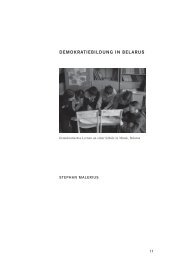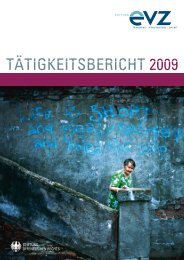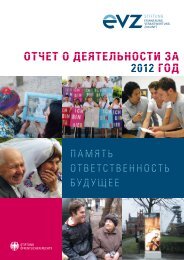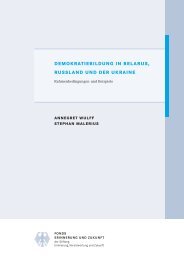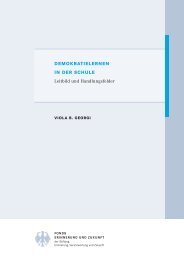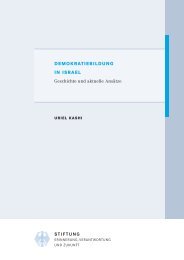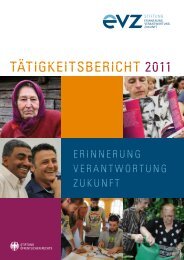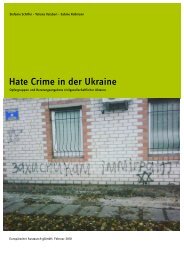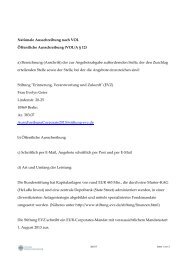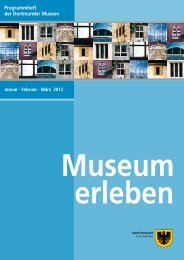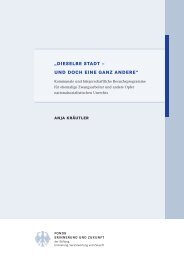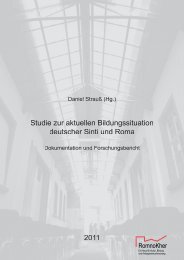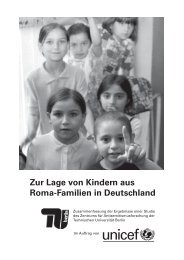chapter 2 - Stiftung "Erinnerung, Verantwortung und Zukunft"
chapter 2 - Stiftung "Erinnerung, Verantwortung und Zukunft"
chapter 2 - Stiftung "Erinnerung, Verantwortung und Zukunft"
You also want an ePaper? Increase the reach of your titles
YUMPU automatically turns print PDFs into web optimized ePapers that Google loves.
Agnès Callamard<br />
ment of every man.” 4<br />
The Inter-American Court of Human Rights also <strong>und</strong>erscored the democratic significance of freedom of expression:<br />
Freedom of expression is a cornerstone upon which the very existence of a democratic society rests. It<br />
is indispensable for the formation of public opinion. It is also a condition sine qua non for the development<br />
of political parties, trade union, scientific and cultural societies and, in general, those who wish<br />
to influence the public. It represents, in short, the means that enable the community, when exercising<br />
its opinions, to be sufficiently informed. Consequently, it can be said that a society that is not well<br />
informed is not a society that is truly free. 5<br />
Freedom of expression is guaranteed <strong>und</strong>er Article 19 of the Universal Declaration on Human Rights (UDHR),<br />
and more or less in similar terms <strong>und</strong>er Article 19 of the International Covenant on Civil and Political Rights<br />
(ICCPR): “Everyone has the right to freedom of opinion and expression; this right includes the right to hold<br />
opinions without interference and to seek, receive and impart information and ideas through any media regardless<br />
of frontiers.” Freedom of expression is also protected in all three regional human rights treaties, in<br />
Article 10 of the European Convention on Human Rights (ECHR), in Article 13 of the American Convention on<br />
Human Rights and Article 9 of the African Charter on Human and Peoples’ Rights.<br />
Freedom of expression, including the right to access information, is therefore a f<strong>und</strong>amental human right,<br />
central to achieving individual freedoms and meaningful electoral democracies. It is a cornerstone or an<br />
empowering right: it safeguards the exercise of all other rights and <strong>und</strong>erpins legitimate government. Without<br />
the right to speak and the right to know, many other human rights cannot be exercised and respected.<br />
Freedom of expression increases the knowledge base and participation within a society. At the same time, it<br />
provides the external checks on state accountability necessary for combating the corruption that thrives on<br />
secrecy and closed environments.<br />
It forms a central pillar of the democratic framework that protects all rights and ensures the exercise of full<br />
citizenship. In turn, a robust democratic framework helps create the stability necessary for society to develop<br />
in a peaceful and prosperous manner. Through freedom of expression, politics can unfold in an unfettered and<br />
constructive manner.<br />
Free expression also allows people to demand the right to health, to a clean environment and to effective<br />
implementation of poverty reduction strategies. It makes electoral democracy meaningful and builds public<br />
trust in administration. Access to information strengthens mechanisms to hold governments accountable for<br />
their promises, obligations and actions.<br />
The free flow of information increases the capacity of all to participate in the life of their nation or community<br />
and in policy-making. Political processes require the freedom to participate in public life, to advance ideas<br />
and to advocate for their realization. Individuals and groups must have the right to demand, without fear of<br />
recrimination or discrimination, that governments uphold their obligations. Freedom of expression enables<br />
individuals and groups to become active the political process.<br />
The media has a specific task to inform the public; it can enhance the free flow of information and ideas to<br />
individuals and communities, which in turn can help them make informed choices for their lives. A free,<br />
independent and professional media, using investigative methods, plays a key role in providing knowledge<br />
4 Handyside v. United Kingdom, Dec. 7, 1976, Application No. 5493/72, para. 49.<br />
5 Compulsory Membership in an Association Prescribed by Law for the Practice of Journalism (Arts 13 and 29 American Convention on Human Rights), Advisory<br />
Opinion OC-5/85, Nov. 13, 1985, Series A, No. 5, para 70.<br />
100<br />
<strong>Stiftung</strong> EVZ<br />
HUMAN RIGHTS AND HISTORY: A CHALLENGE FOR EDUCATION



